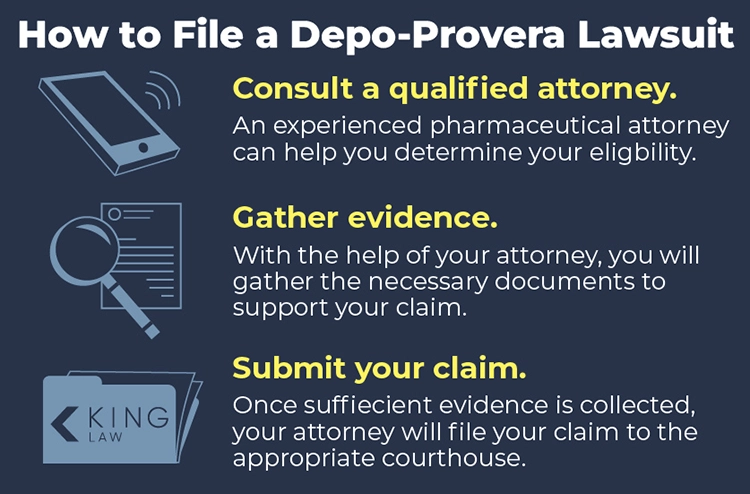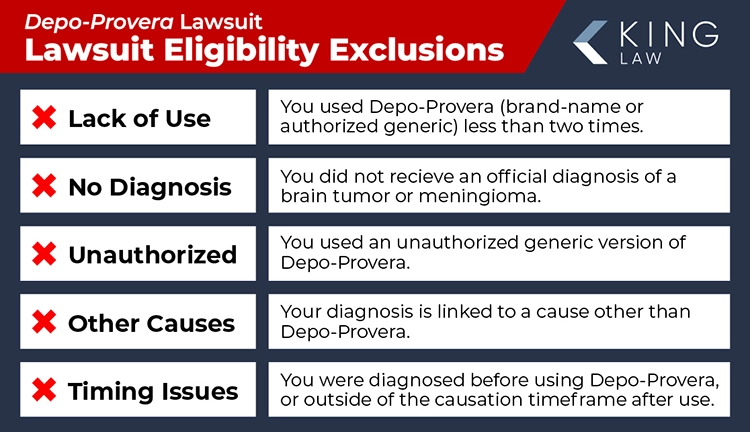
If you have been diagnosed with a brain tumor, such as a meningioma, after taking the injectable birth control Depo-Provera, you may qualify for a lawsuit. In order to qualify for a claim, you must meet certain criteria. The best way to determine if you qualify to take legal action is by consulting with an experienced attorney. In general, you must be able to prove long-term use of Depo-Provera and that you were diagnosed with a serious side effect or injury related to its use.
At King Law, our attorneys are well-versed in handling Depo-Provera lawsuits. We can assist in determining whether you meet the legal requirements to file a claim and what evidence you may need to substantiate your claim. It is imperative to act quickly as you may have a limited amount of time to file a lawsuit due to the statute of limitations.
How to Qualify for a Depo-Provera Lawsuit:
Why Are People Filing Depo-Provera Lawsuits?
What Are the Alleged Complications of Depo-Provera?
The Link Between Depo-Provera Side Effects and Legal Claims
Do I Qualify Depo-Provera Lawsuit?
How to Determine If You Qualify for a Depo-Provera Lawsuit
Exclusions for Eligibility in the Depo-Provera Lawsuit
What Compensation Can Be Sought in a Depo-Provera Lawsuit?
Steps to Take If You Think You Qualify for a Depo-Provera Lawsuit
Why Are People Filing Depo-Provera Lawsuits?
Individuals are filing lawsuits against the manufacturer of Depo-Provera, alleging that the company knew or should have known about the safety risks associated with its use and failed to warn consumers. Many legal claims are based on Depo-Provera patients who have developed serious injuries after taking the contraceptive, such as meningiomas, brain tumors, and cysts. According to legal documents, plaintiffs have accused the manufacturer of marketing the drug prior to completing adequate safety testing and that the drug itself is defective.
These factors have led to serious health issues, including brain tumors, which require surgery for removal. The development of these side effects has prompted individuals to seek legal action against the manufacturer for compensation. Compensation in these lawsuits may include coverage for medical bills, lost wages, pain and suffering, and more.
What Are the Alleged Complications of Depo-Provera?
There are a number of potential complications associated with the use of the injectable contraceptive Depo-Provera. Common side effects include changes in menstrual cycles, headaches, and weight gain. However, long-term use of the drug has also been associated with more severe side effects, such as meningiomas, a rare type of brain tumor that may require surgery to remove.
Potential Complications and Side Effects of Taking Depo-Provera:
- Changes in menstrual cycles
- Irregular menstrual cycles
- Depression
- Osteoporosis (bone loss)
- Hair loss
- Headaches
- Weight gain
- Dizziness
- Blood clots
- Severe allergic reactions
- Acne
- Pseudotumor cerebri
- Brain tumors, including meningiomas
The impacts of serious complications related to the use of Depo-Provera can impact a person’s quality of life. Depending on the severity of the injury, a person could require extensive treatment to remove a brain tumor or other serious condition. These side effects have led to legal claims and lawsuits against Depo-Provera, which remain ongoing.
The Link Between Depo-Provera Side Effects and Legal Claims
A March 2024 study of over 100,000 women published in the British Medical Journal (BMJ) found a link between the prolonged use of progestogens and an increased risk of meningiomas. These findings highlight the need for additional studies to determine the potential dangers associated with the use of Depo-Provera and other hormonal birth controls.
Individuals who were diagnosed with a brain tumor or other serious side effects after taking Depo-Provera may be able to file a lawsuit against the manufacturer, Pfizer, Inc. The development of meningiomas or other severe injuries may provide the basis for pursuing legal action based on the pharmaceutical company’s failure to warn and defective design. It is important to speak with an attorney to determine whether your Depo-Provera health issues entitle you to compensation.
Do I Qualify Depo-Provera Lawsuit?
To qualify for a lawsuit, individuals must have used the brand-name (Pfizer) Depo-Provera, depo-SubQ Provera, or an authorized generic version at least twice and must have been diagnosed with a meningioma or brain tumor after depot medroxyprogesterone acetate (DMPA) usage. Eligibility may be further influenced by the duration of use, time elapsed since last use, and specific diagnosis. It is important to speak to an attorney as soon as possible to determine eligibility.
Qualification requirements for a Depo-Provera lawsuit:
- Usage Requirements: You must have used Pfizer’s brand name Depo-Provera, depo-SubQ Provera, or an “authorized generic” version of Depo-Provera at least twice.
- Diagnosis Requirements: You must have been diagnosed with meningioma or a brain tumor after using Depo-Provera.
- Connection Requirements: You must be able to show a potential link between Depo-Provera and an increased risk of brain tumors in some women. Individuals diagnosed with a brain tumor after taking Depo-Provera may be entitled to compensation.
Additional considerations for eligibility include the duration of use of Depo-Provera or its generic version, the time elapsed between the last use of the contraceptive and diagnosis, and the specific diagnosis. Individuals who have suffered a brain tumor after taking Depo-Provera may be entitled to file a brain tumor lawsuit against the manufacturer.

How to Determine If You Qualify for a Depo-Provera Lawsuit
The best way to determine if you meet the eligibility criteria for filing a Depo-Provera lawsuit is to consult with a qualified attorney. An attorney can review your case and help ensure you receive the compensation you deserve.
Follow these 3 steps to determine if you qualify for a Depo-Provera lawsuit:
- Consult with an attorney: The first step in determining if you qualify for a Depo-Provera lawsuit is to consult with an experienced attorney. An attorney will conduct a free initial case evaluation to ensure you meet the criteria necessary to take legal action. Eligibility criteria include proven use of Depo-Provera and a diagnosis of a meningioma or other serious side effects.
- Collect evidence: Prior to filing a claim, you will need to gather evidence that can help substantiate your claim. Important documents may include your medical records, treatment plan, proof of lost wages, expert opinions, studies or research showing a link between Depo-Provera and brain tumors, and any hospitalizations related to your injuries. Your attorney will work to establish that your brain tumor was caused by Depo-Provera use.
- Review legal requirements: Depo-Provera lawsuits are governed by a statute of limitations that limits the amount of time you have to file a claim. Failure to file a lawsuit within the statute of limitations could result in your claim for compensation being denied. An attorney can help ensure you meet all legal requirements.
In addition to these requirements, factors such as the duration of use, the amount of time that elapsed between Depo-Provera use and diagnosis, and the severity of the injury may all impact your right to compensation. If your attorney determines you qualify to file a lawsuit, you can pursue compensation through a jury award or settlement. Depo-Provera settlement amounts will vary depending on the success of your case and individual circumstances.

Exclusions for Eligibility in the Depo-Provera Lawsuit
Certain situations may disqualify you from being able to pursue legal action despite having taken Depo-Provera and being diagnosed with a serious side effect. It is essential to discuss your case with an attorney to see if there are any exclusions that may apply to your claim.
Situations which may exclude you from eligibility in a Depo-Provera lawsuit:
- Insufficient Usage: Individuals who used Depo-Provera (brand-name or authorized generic) fewer than two times are excluded, as repeated use is necessary to establish a link to health complications.
- Diagnosis Requirement: Individuals who were not diagnosed with a meningioma or brain tumor after using Depo-Provera are ineligible, as the claims focus specifically on this link.
- Unauthorized Generic Use: Those who used only a non-authorized generic version of Depo-Provera are excluded. Eligibility requires the use of the brand name or authorized generic version.
- Timing Issues: Individuals diagnosed long before or long after using Depo-Provera may be excluded, as the diagnosis must fall within a timeframe that supports causation.
- Other Causes: Individuals whose brain tumor is linked to a cause other than Depo-Provera usage are not eligible.
- No Direct Link: Those who do not meet these criteria—such as lacking a brain tumor directly linked to Depo-Provera usage—are not entitled to file a lawsuit against the manufacturer.

What Compensation Can Be Sought in a Depo-Provera Lawsuit?
Compensation that can be shown in a Depo-Provera lawsuit includes coverage for medical bills related to the treatment of meningiomas, pain and suffering, lost wages, and any long-term care costs. Aggrieved individuals may be eligible for both economic and non-economic damages. Consulting with an attorney as early in the process as possible can help to determine the potential value of your case.
Compensation that may be available in a Depo-Provera lawsuit:
- Medical bills: You may be eligible for compensation related to your medical bills and expenses, including the cost of future treatment and long-term care.
- Lost wages: In Depo-Provera lawsuits, you are likely entitled to recovery related to lost wages and the loss of future earning capacity.
- Pain and suffering: Depending on the situation, you may be eligible for compensation related to your physical pain and emotional suffering. These types of damages are often hard to quantify without the help of an attorney.
- Punitive damages: In rare cases, you may be eligible for punitive damages, which are designed to punish the defendant for their actions.
Steps to Take If You Think You Qualify for a Depo-Provera Lawsuit
If you believe that you qualify for a Depo-Provera lawsuit, there are several steps you can take. These steps include consulting with an attorney experienced in Depo-Provera lawsuits or pharmaceutical injury claims and gathering the necessary evidence to substantiate your claim.
- Consult with a qualified attorney: If you believe you may qualify for a Depo-Provera lawsuit, you need to consult with a qualified attorney. An attorney experienced in pharmaceutical injury claims can help to evaluate whether you are eligible to take legal action. They will also guide you through the process, including determining what evidence you may need to prove your claim.
- Gather the necessary evidence: Through the assistance of legal counsel, you will need to gather the necessary documentation to substantiate your claim. Evidence may include your medical records, prescription history, and any data that may help to establish a link between the contraceptive and your injuries.
- File the claim: Once the proper evidence is collected, your attorney will file a claim in the appropriate courthouse. It is important to work with an attorney who has an in-depth knowledge of the legal requirements, including the statute of limitations, which may apply to your case. An attorney will help provide you with the guidance and resources you need to get the best possible outcome in your case, including maximizing the potential for compensation.
Some women may be eligible to join the multidistrict lawsuit against Depo-Provera manufacturers ( IN RE: Depo-Provera (Depot Medroxyprogesterone acetate) Products Liability Litigation). Many women have joined the group lawsuit, which has been consolidated in Florida federal courts. Joining this litigation can have many advantages for women, including access to group fact-finding and expert witnesses.
Get Started: Contact a Depo-Provera Lawyer Today
Were you diagnosed with meningiomas after taking Depo-Provera? You might be entitled to compensation by filing a lawsuit against the manufacturer. Contact King Law to discuss your potential case with an experienced attorney. Our office provides a free consultation to help you determine eligibility, understand your rights, and take the first step toward seeking compensation. Contact our office today to speak directly with a member of our legal team and understand how to file a Depo-Provera lawsuit.

